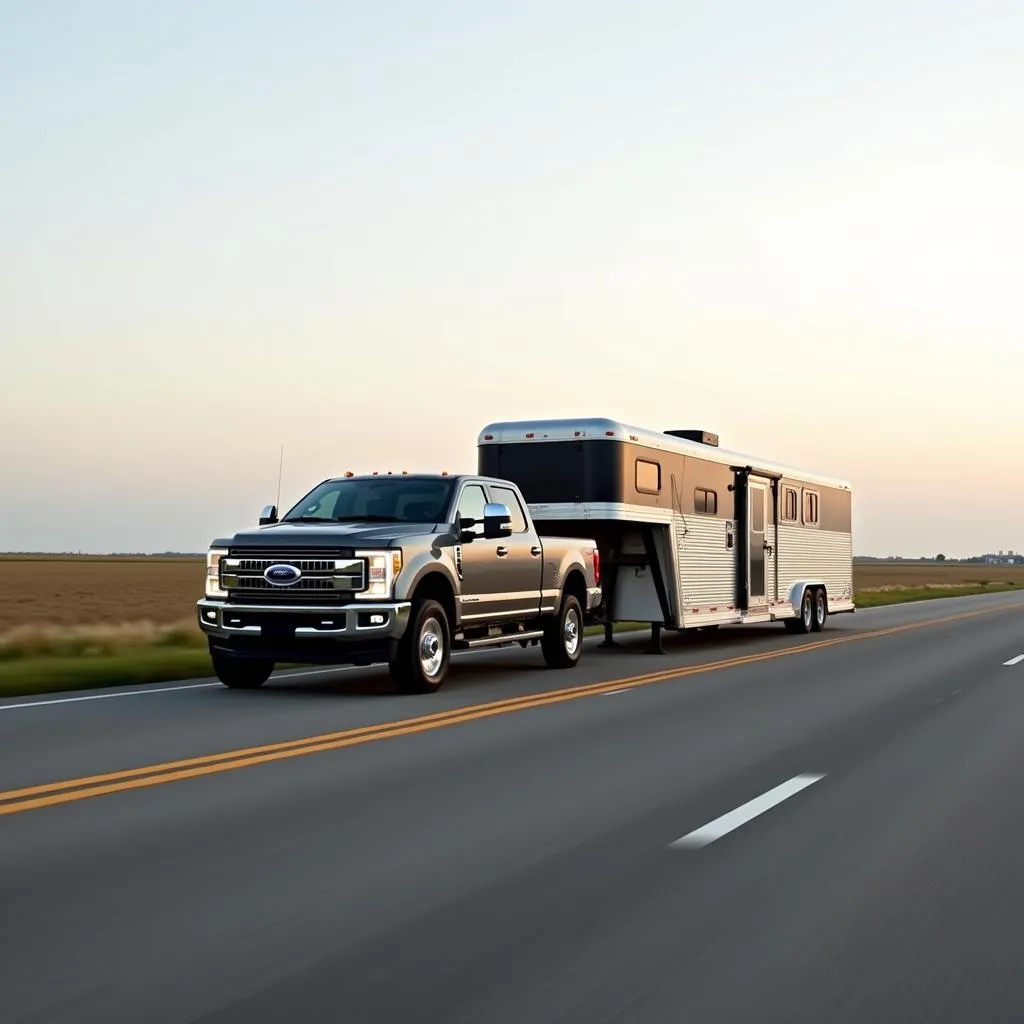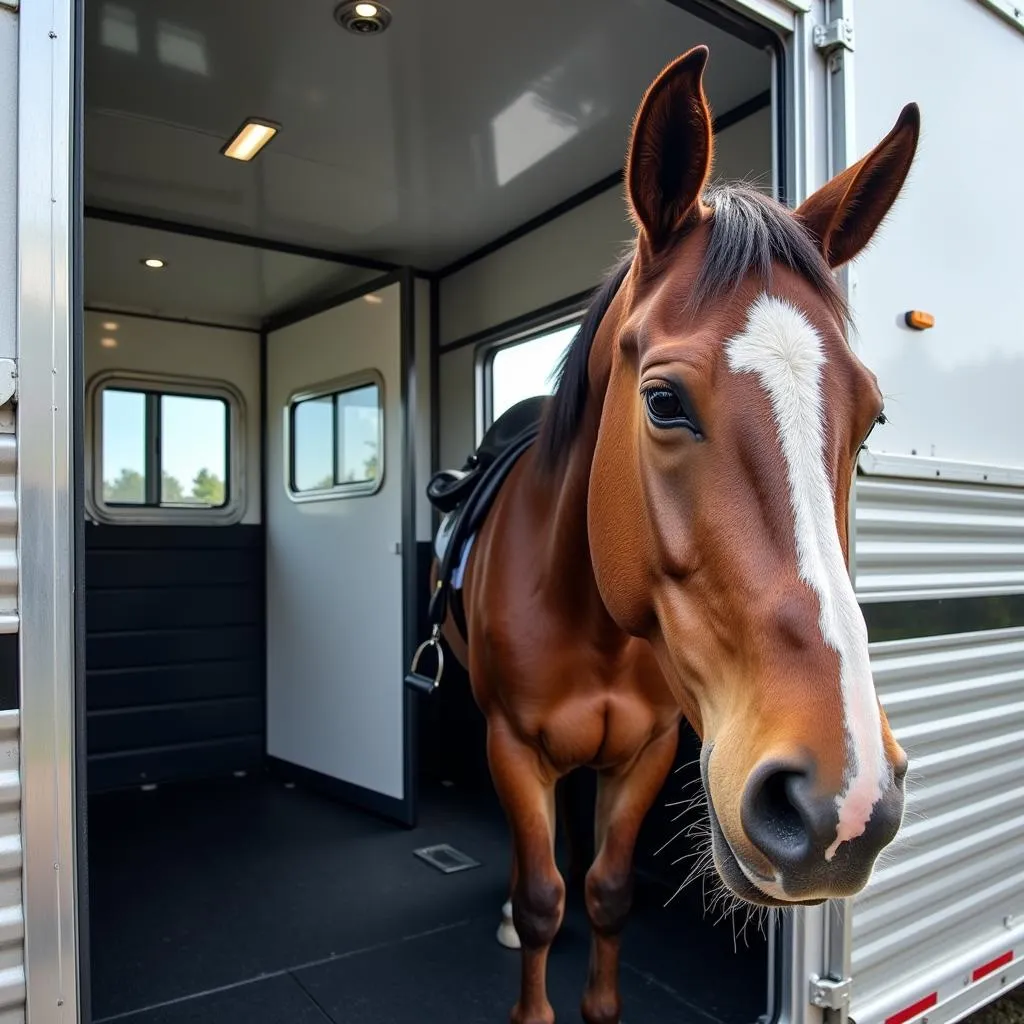Transporting your equine companion safely and comfortably is paramount, and selecting the right Horse Trailer Truck is a crucial decision for any horse owner. This guide will equip you with the knowledge to make an informed choice, covering everything from understanding different truck and trailer types to essential safety features and legal considerations.
Matching Your Truck to Your Trailer: A Vital Partnership
 Heavy-duty pickup truck towing a horse trailer
Heavy-duty pickup truck towing a horse trailer
Before diving into truck specifics, understanding your trailer’s weight is essential. The combined weight of the trailer and its maximum load is known as the Gross Combined Weight Rating (GCWR). Your truck’s Gross Combined Weight Rating (GCWR) must exceed the trailer’s GCWR for safe towing.
Key Truck Considerations:
- Towing Capacity: This is the maximum weight your truck can safely tow and is influenced by factors like engine size, transmission, and axle ratio. Always prioritize a truck with a higher towing capacity than your anticipated needs.
- Engine Power: Opting for a diesel engine is generally recommended for hauling heavy horse trailers due to their superior torque and fuel efficiency.
- Transmission: A heavy-duty automatic transmission designed for towing will provide smoother gear changes and reduce strain on the drivetrain.
- Drivetrain: Four-wheel drive (4WD) or all-wheel drive (AWD) offers enhanced traction and control, especially on slippery or uneven surfaces often encountered when transporting horses.
Popular Horse Trailer Truck Types
- Heavy-Duty Pickup Trucks: These are the most common choice for towing horse trailers, offering a balance of power, comfort, and versatility for everyday use.
- Chassis Cab Trucks: For larger, heavier trailers, chassis cab trucks provide increased towing capacity and stability. These trucks are specifically designed for heavy hauling and offer a wider range of customization options.
Essential Safety Features for Horse Trailer Trucks
 Horse trailer with advanced safety features
Horse trailer with advanced safety features
- Trailer Brake Controller: Allows you to control the trailer’s brakes independently from the truck, ensuring smooth and controlled stops.
- Tow Mirrors: Extend your field of vision, eliminating blind spots and enhancing trailer visibility.
- Weight Distribution Hitch: Distributes the trailer’s weight evenly across the truck and trailer axles, improving stability and reducing sway.
- Backup Camera: Provides a clear view behind the trailer, simplifying hitching and maneuvering in tight spaces.
Legal Requirements and Regulations
- Trailer Brakes: Most states mandate brakes on trailers exceeding a specific weight, typically around 1,500 to 3,000 pounds.
- Trailer Lights: All trailers must be equipped with functioning brake lights, turn signals, and taillights.
- Driver’s License: Depending on the combined weight of your truck and trailer, you may need a special driver’s license endorsement.
FAQs
Q: How much can a standard pickup truck tow?
A: Towing capacity varies greatly depending on the truck’s make, model, and engine. Refer to your vehicle’s owner’s manual for specific towing limits.
Q: What is a gooseneck hitch?
A: A gooseneck hitch is a type of trailer hitch that mounts in the bed of a pickup truck, providing a more secure connection and higher towing capacity compared to a bumper-mounted hitch.
Q: Can I tow a horse trailer with a half-ton truck?
A: While possible in some cases with lightweight trailers, it’s generally not recommended. Half-ton trucks often lack the necessary towing capacity and stability for safe horse transportation.
Need More Help?
Selecting the perfect horse trailer truck is a significant decision. For personalized guidance and support, don’t hesitate to contact us. Our team of equine transport experts at Justus Horses USA is here to answer your questions and help you find the ideal vehicle for your needs. Call us at 0772127271, email us at [email protected], or visit us at our location QGM2+WX2, Vị Trung, Vị Thuỷ, Hậu Giang, Việt Nam. We offer 24/7 customer support to ensure you have the information and resources you need.